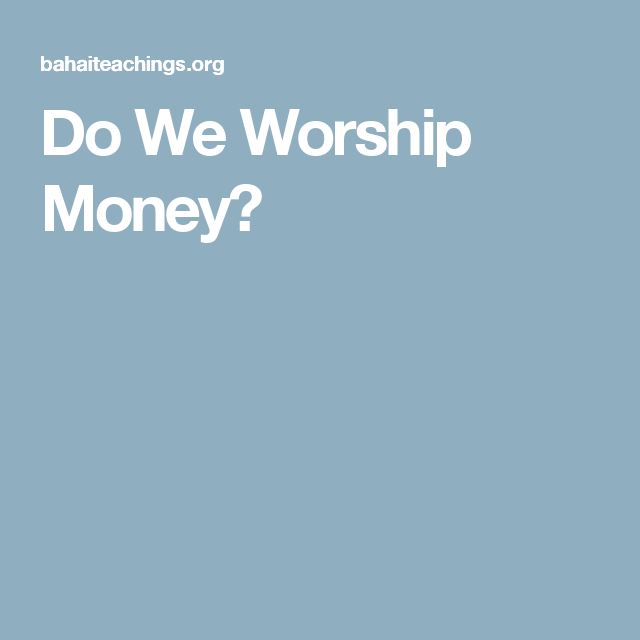In the tapestry of human existence, one can discern a multifaceted relationship with the concept of wealth, particularly in the context of contemporary society. The allure of money often appears as a siren song, captivating hearts and minds alike. Its glimmering facade, albeit attractive, may beg the question: Do we worship money? Within the framework of Bahá’í teachings, this inquiry delves into the essence of wealth, human values, and the potential spiritual ramifications of materialism.
The Bahá’í Faith posits that wealth, while a useful instrument, is not an end in itself; rather, it should serve as a means of fostering community, upliftment, and spiritual advancement. As such, the perspective on wealth transcends mere accumulation and enters the realm of purposefulness. Indeed, the Bahá’í teachings assert that true prosperity is achieved not through amassing riches, but through the promotion of collective well-being and the equitable distribution of resources.
At the core of this discussion lies the metaphor of the “Two Gardens.” One garden, resplendent and overflowing with material abundance, symbolizes the earthly treasures that captivate so many. The other garden, though perhaps less ostentatious, emanates a different kind of beauty, nourished instead by virtues such as compassion, justice, and love. The Bahá’í Faith encourages individuals to cultivate the latter garden, emphasizing that the fruits of virtue yield a far richer harvest than the brief pleasures afforded by wealth.
However, the challenge remains: in a world inundated with consumerism and the incessant chase of monetary gain, how can one discern the boundary between healthy ambition and idolatry of wealth? The Bahá’í teachings provide a compass, guiding adherents to prioritize spiritual aspirations over materialistic pursuits. It is often stated, “The love of money is the root of all evil,” hinting at the moral quandaries that arise when the pursuit of wealth eclipses ethical considerations. The danger lies in fostering an attachment to the transient nature of material possessions, leading to spiritual disillusionment.
This leads to a critical exploration of the motivations behind financial pursuits. Are individuals driven by the desire for status, security, or fulfillment? In the Bahá’í perspective, the mere act of earning a livelihood is not intrinsically noble or ignoble; rather, the ethos with which it is approached defines its spiritual consequence. Thus, the transformative power lies not in financial gain itself, but rather in the attitudes and intentions that shape one’s relationship with wealth.
Another salient aspect of Bahá’í teachings on wealth is the call for social responsibility. The scriptures emphasize the importance of utilizing one’s financial resources to aid others and support community development. When individuals view money as a communal resource—a tool for alleviating suffering and fostering equality—they embark on a more spiritually enriching path. This paradigm shift from personal enrichment to communal upliftment redefines the notion of wealth from something to hoard to a means of collective illumination.
Moreover, the Bahá’í Faith promotes the principle of detachment, suggesting a balanced view of wealth where individuals are encouraged to enjoy the benefits of material resources without succumbing to their seductive nature. Detachment does not equate to renunciation; rather, it embodies a harmonious relationship with material possessions. One can appreciate the beauty of the world while maintaining an inward focus on higher spiritual realities. Life’s true riches lie within the character, service, and love harnessed towards others.
It is essential to acknowledge that economic inequity remains a pressing challenge. The Bahá’í teachings call attention to the ethical dimensions of wealth redistribution, advocating for systems of justice and fairness amid economic disparity. An enlightened society must strive towards inclusivity, ensuring that the bounties of the earth benefit all, not just a privileged few. This collective ethos cultivates an environment where individuals are motivated by a sense of shared responsibility, further deepening their connection to others and the Divine.
A critical question arises: How can this understanding of wealth be practically implemented in everyday life? The Bahá’í teachings advocate for education as a pivotal agent for change. Through nurturing a culture of learning, individuals are empowered to make informed choices regarding their financial conduct. Education cultivates mindfulness regarding the impact of one’s financial decisions on the broader community, ultimately steering one’s focus towards sustainable development and ethical practices.
Ultimately, the pursuit of wealth, when infused with Bahá’í principles, transforms from a potential source of conflict to an avenue for spiritual elevation. The metaphysical implications of our relationship with money provoke contemplation: Does one’s financial behavior reflect the divine attributes of generosity and kindness? Are monetary transactions avenues for service rather than self-aggrandizement? These questions serve as reflective guides, challenging every individual to assess their priorities in a world where materialism often reigns supreme.
In conclusion, the teachings of the Bahá’í Faith provide a comprehensive framework that situates money within a spiritual context. The pondering of whether we worship money is not merely an inquiry into individual behavior; it is a call to collective introspection. By fostering virtues of compassion, equity, and service, the Bahá’í perspective encourages humanity to navigate the complexities of wealth in a manner that uplifts both the individual and the community. Ultimately, the path to genuine prosperity is paved not with gold, but with the values that unite and elevate the human spirit.
